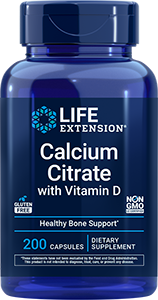
How to Take Calcium Supplements for the Best Absorption
Published: September 2022
Growing up, your parents probably encouraged you to drink your milk so that you'd be big and strong. That's because milk is one of the biggest and most available sources of calcium, and calcium can help to make you stronger. But it does a lot more than that, which is why some people choose to take a calcium supplement.
Let's explore exactly calcium is and does, how much calcium you need to be taking, and how you can best utilize calcium supplements to support your health.
What is calcium?
Our bodies need a variety of minerals to function and grow properly. You're probably familiar with many of these minerals, like potassium, sodium, magnesium, iron, zinc, and iodine. Another mineral we need is calcium! Indeed, your body needs calcium in order to function properly. In fact, this is the most abundant mineral you carry.
Calcium plays an important role in:
- Tooth and bone health
- Blood vessel health
- Helping your muscles to contract
- Maintaining your heart rhythm and nerve functions
- Releasing hormones
Almost all of your body's calcium—99%!—is stored in your bones. The last 1% is hanging out in your blood, muscles, and other types of tissue.
Why is calcium important for the body?
We're so glad you asked! You already know that almost all of your body's calcium resides in your bones. In other words, without sufficient calcium, your bone health can be negatively impacted. Calcium is crucial for strong bones and bone structure. If you don't get enough of this mineral, over time, it can impact bone mass, bone mineral density, and overall bone health. If you're not getting enough from your diet, you can supplement with calcium to help protect your bone health and joints.
A lack of calcium in your body can lead to muscle discomfort, too. This is because calcium helps your muscles to contract. When you're low in this mineral, the occurrence of occasional muscle discomfort can increase, particularly in your legs and back. (Fun fact: magnesium plays a role in your muscles, too.)
There's a relationship between calcium and your pearly whites, as well. Your teeth provide some of the hardest surfaces of your body, and they need calcium to stay that way. Research has found a connection between calcium levels and healthy teeth. Tooth health is especially important in older adults, meaning that we have to be even more mindful of calcium as we age.
So, it turns out that there was a good reason your parents told you to drink your milk. It gives you strong bones, and so much more—and calcium supplementation can boost the benefits.
How much calcium do you need a day?
How much calcium should we aim to get each day? The amount of calcium you need will depend on your age and sex. But generally, babies and infants need in the ballpark of 200-260 mg, children and teens need 700-1300 mg, and adults need anywhere from 1000-1200 mg.
Also keep in mind that with many (if not most) supplements, more isn't always better. Increasing your calcium intake won't continue to improve your bone health. Always stick to the recommended dosages. This is enough calcium to keep your bones healthy and enjoy the other benefits that the mineral offers without chancing any side effects.
You're already getting some of the calcium you need from the food and drinks you consume, after all. And if you're already getting near-sufficient calcium in your diet, be extra mindful of how you're supplementing with it!
What type of calcium is best absorbed by the body?
"Calcium" is technically an umbrella term. There are various types of calcium and calcium supplements, and each contains a different percentage of elemental calcium. Some popular calcium supplement types include:
Calcium carbonate
(40%)Calcium citrate
(21%)Calcium gluconate
(9%)Calcium lactate
(13%)
While each type of calcium serves its own purposes, calcium supplements are more commonly formulated with calcium carbonate or calcium citrate. This is because they contain the greatest amount of elemental calcium out of these four types. Plus, calcium carbonate tends to be the most affordable. On the other hand, calcium citrate is considered to be more easily absorbed than calcium carbonate. However, you would need to take more to reach your daily requirement. Some calcium supplements contain a combination of both calcium carbonate and citrate, so you get the best of both worlds.
A final point to consider when thinking about other forms of calcium is organic vs inorganic. When we're talking about "organic," we mean from a chemical standpoint. Organic salts have carbon-hydrogen or carbon-carbon bonds. Inorganic salts do not. You might be wondering, "Who cares?!" Well, organic forms of salts (like citrate) are better absorbed than inorganic salts (like carbonate). However, organic salts typically contain less elemental calcium.
Explore Our Best Bone Health Supplements
What interferes with the absorption of calcium?
Not every human utilizes calcium equally. Different factors can make it harder for your body to absorb calcium. These include:
- Your age
- Various health factors
- For women, whether you're in menopause
- The medication you're taking
For instance, one study found an age-related decrease in calcium absorption, particularly in menopausal and postmenopausal women. And those taking medications that affect your cholesterol can also get in the way of your body absorbing calcium.
Does coffee deplete calcium?
In addition to the factors mentioned above, one theory is that coffee can get in the way of your body absorbing calcium. What does research tell us?
Well, it's been a bit mixed. In the past, research has suggested that consuming caffeine could trigger your body to excrete more calcium. In other words, instead of your body retaining that calcium, it eliminates it.
However, other research is showing that this is unlikely to be an issue. For instance, one report argued that there's no evidence proving that caffeine negatively impacts your bone and joint health or calcium supply, as long as you're consuming healthy levels of calcium on a daily basis. In fact, the negative effect of caffeine on your calcium absorption is so minor that simply adding one to two tablespoons of calcium-containing milk to your coffee is enough to offset it.
The consensus seems to be that you'd need to drink an incredibly excessive amount of coffee for any real impact to your body's calcium levels. So, there's no need to give up your beloved morning cuppa joe.
How to take calcium supplements for the best absorption
How you take calcium supplements is just as important as the type of calcium supplement you're using. You might think that a high-dose approach is best, but that's not quite right. To help your body better absorb it, take it in smaller doses throughout the day. Try to stick to 500 mg or less at a time. The body will absorb about 36% of a 300 mg dose and 28% of a 1000 mg dose. The same thing applies to the calcium you get from your food! A little dairy (or other high-calcium food) throughout the day is better than a smorgasbord milk at one meal. Taking larger amounts leads to decreased absorption, so a low-dose approach is more effective.
It's best to take calcium supplements with food—because your stomach acid will help break it down. An exception to this rule is calcium citrate, which can be taken with or without a meal. (However, worth noting is that the Office of Dietary Supplements still recommends that you take any calcium supplement with food.)
What to take with calcium for better absorption
How about what, specifically, you consume with your calcium supplements to make sure you're getting the most from this mineral? One of the best things to pair it with is vitamin D, which helps your body absorb calcium. There are natural food sources of vitamin D, including:
- Tuna fish
- Egg yolks
- Salmon
- Fortified cereals
Your body also produces vitamin D when you're exposed to sunlight. That's why some people call it the sunshine vitamin! But it's simply not possible for many of us to get enough vitamin D naturally. That's why you need a potent vitamin D supplement.
It's not unusual to find calcium and vitamin D combo formulas, either.
Be mindful if you're following a vegan diet, because this is one mineral vegans tend to be deficient in, along with vitamin D. Thankfully, there is plenty of non-dairy, plant-based milk that contains calcium. Soy, beans, nuts, seeds, and certain fruits and veggies can also be calcium-rich foods. You don't need to consume dairy foods, animals, or animal byproducts to get your daily calcium intake. There are plenty of other calcium-fortified foods, like cereal, that are good sources of the mineral—without needing to consume dairy products or meat—so that you don't experience calcium deficiency.
Is calcium better absorbed at night?
When it comes to calcium absorption, splitting it up into smaller doses throughout the day has a bigger impact on getting enough calcium than timing does. However, this often means that by default, you'll be taking some of your calcium supplements at night.
What does the research say, though? Well, the results vary a little bit, but the general consensus is that the body responds the same to calcium whether you take it in the morning or at night. Just be mindful of taking your calcium supplement on an empty stomach (unless you've opted for calcium citrate).
What are the best calcium supplements to take?
The exact type of calcium supplement you'll take might vary depending on your needs and goals. Some people might prefer calcium carbonate over citrate, or vice versa.
If you want to support your bone density and strength specifically, you might find Bone Restore or Bone Restore Elite most beneficial. These contain both calcium carbonate and citrate. If you feel you need extra help with absorption, Calcium Citrate with Vitamin D could be a better fit. And to help your body support detoxification, promote a healthy inflammatory response, and maintain already-healthy cholesterol levels, Calcium D-Glucarate can provide support.
Another great idea? Many people take vitamin D3 and vitamin K2 together. This is because they help to optimize the proper delivery of calcium. More specifically, vitamin D3 (the most popular form of vitamin D) leads the absorption of calcium from your intestines into the blood. And vitamin K2 then directs the calcium to your bones.
And once again, if for any reason, you can't or don't want to take your calcium with food, stick with citrate.
Who shouldn't take calcium supplements?
While calcium supplements are generally safe and well-tolerated with minimal to no side effects, it's always smart to speak with your healthcare provider before starting any new dietary supplements. Additionally, there are other factors to consider. Certain medications could potentially interact negatively with calcium supplements. Talk to your doctor or pharmacist first—they will flag potential contraindications.
Keep your bones healthy with calcium supplements
In a perfect world, we'd get all of the vitamins and minerals that we need from the food we eat. However, in the present day, for most of us, this just isn't possible. That's where calcium supplements come in. Smart supplementation can help you feel better and improve your overall quality of life.
References
- Corliss, Julie. "Choosing a calcium supplement." Harvard health Publishing, October 2020, https://www.health.harvard.edu/nutrition/choosing-a-calcium-supplement
- Heaney, R P. "Effects of caffeine on bone and the calcium economy." Food Chem Toxicol., September 2002, https://pubmed.ncbi.nlm.nih.gov/12204390/
- Kärkkäinen, Merja UM et al. "Does it make a difference how and when you take your calcium? The acute effects of calcium on calcium and bone metabolism." The American Journal of Clinical Nutrition, September 2001, https://academic.oup.com/ajcn/article/74/3/335/4739593
- Mayo Clinic Staff. "Calcium and calcium supplements: Achieving the right balance." Mayo Clinic, February 2022, https://www.mayoclinic.org/healthy-lifestyle/nutrition-and-healthy-eating/in-depth/calcium-supplements/art-20047097
- Nordin, B E Christopher et al. "Effect of age on calcium absorption in postmenopausal women." Am J Clin Nutr., October 2004, https://pubmed.ncbi.nlm.nih.gov/15447911/
- Reuter, Stephanie E et al. "The effect of high-dose, short-term caffeine intake on the renal clearance of calcium, sodium and creatinine in healthy adults." Br J Clin Pharmacol., November 2021, https://pubmed.ncbi.nlm.nih.gov/33852164/
- Vannucci, Letizia et al. "Calcium Intake in Bone Health: A Focus on Calcium-Rich Mineral Waters." Nutrients, December 2018, https://www.ncbi.nlm.nih.gov/pmc/articles/PMC6316542/
- "Calcium." National Institutes of Health, https://ods.od.nih.gov/factsheets/calcium-healthprofessional/
- "Calcium." Harvard T.H. Chan School of Public Health, https://www.hsph.harvard.edu/nutritionsource/vitamin-d/
- "Definitions of Health Terms: Minerals." Medline Plus, https://medlineplus.gov/definitions/mineralsdefinitions.html
- "Possible Interactions with: Calcium." St, Luke's Hospital, https://www.stlukes-stl.com/health-content/medicine/33/000945.htm
- "Runner's World: 5 Signs You're Not Getting Enough Calcium." Cedars-Sinai, February 2019, https://www.cedars-sinai.org/newsroom/runners-world-5-signs-youre-not-getting-enough-calcium/
- "The aging mouth – and how to keep it younger." Harvard health Publishing, January 2010, http://health.harvard.edu/diseases-and-conditions/the-aging-mouth-and-how-to-keep-ityounger









